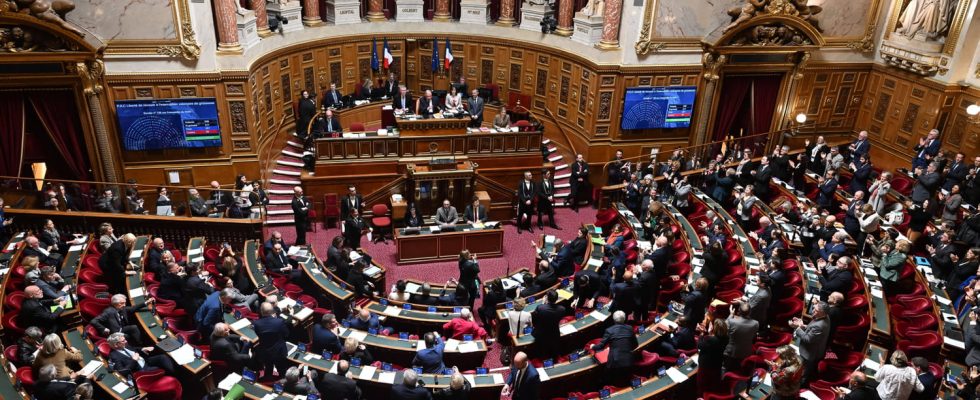The Senate opposed the ratification of the free trade agreement between the European Union and Canada this Thursday, March 21. The parliamentarians’ decision could call into question the agreement already partly implemented.
Will the free trade agreement between the European Union and Canada be ratified by France? A first obstacle opposed the comprehensive economic and trade agreement (Ceta), or the global economic and trade agreement (AECG) in French, this Thursday, March 21: the senators mainly voted against the agreement. The outcome of the vote in the upper house of the Senate is not a surprise since several voices opposed to the text were heard on both the left and the right, especially after the agricultural crisis during which negotiations on the agreement free trade with Mercosur, the South American economic alliance, had already been singled out.
The commercial aspect of Ceta, which depends on European Union policy, has already been applied since 2017. At the time, the heads of state and the European Parliament supported the agreement. But the other part of the text which concerns investment measures requires the approval of the 27 EU countries, but only 17 have so far approved the agreement.
What does the Ceta free trade agreement provide for?
The free trade treaty between the EU and Canada governs and above all simplifies trade between the two economic zones. But it can be boiled down to three main objectives:
- Reduce customs duties between the two zones to facilitate the movement of goods and services;
- Reduce regulations that act as obstacles to trade, particularly protectionist measures;
- Create a special court dedicated to European and Canadian companies that invest in the other zone.
It is an economic agreement which should boost transatlantic trade and exchanges through access to new markets and allow the creation of jobs according to the main arguments of its defenders. The government which supported the agreement in 2017 also puts forward the results observed for six years among these arguments: Ceta has made it possible to increase French exports to Canada by 33%. But this increase would be mainly due to inflation and the quantity of goods traded; it would have only increased by 9% according to a report from the Veblen Institute, an environmental NGO hostile to Ceta.
Competition, environment… A criticized agreement
If economically the Ceta free trade agreement seems to present advantages, many criticisms have been made about the consequences it would entail. Opposition to the deal is particularly strong in the agricultural sector. Breeders fear that facilitating the export of Canadian products will create unfair competition for them. In the absence of a mirror clause which would force Canada to align itself with European production standards, products imported into Europe would respect less strict charters than European products and these differences would have repercussions on prices, but also on health standards of goods.
It is also the effects of trade on the climate that worry Ceta’s opponents. Facilitated trade, there would be more exchanges and would increase greenhouse gas emissions. Experts commissioned by the government in 2017 were categorical about this harmful consequence of the environmental agreement.
While commercial, economic and environmental measures could be taken to offset these effects of Ceta, critics of the agreement fear that all attempts at legislation will be undermined by the creation of the special courts provided for by Ceta. Some believe that these jurisdictions would put corporate interests ahead of environmental interests.
The ratification of Ceta doomed to failure in France?
Unsurprisingly, French senators spoke out against the ratification of Ceta. The chances of ratification of the agreement by the senators were low, it is precisely because of this that the government, discouraged by the specter of an almost certain defeat, never brought the text to the Senate after the vote in the National Assembly which dates back to 2019. Already at the time, the deputies had ratified the text with a very narrow majority (266 for, 213 against and 74 abstentions) and at the cost of a divide in the majority. Imposed on the agenda by the communist group during its parliamentary niche, Ceta was ultimately rejected as one might expect.
Communist senators had already expressed their opposition to the agreement and they were joined by environmentalists and socialists. But above all they were able to count on part of the right, a majority in the Senate. Within the Les Républicains party, no voting instructions had been given, but “a fairly clear majority” of elected officials were expected to oppose the ratification of Ceta, predicted senator Max Brisson to franceinfo.
But now, this rejection of the agreement risks burying Ceta. After opposition from the Senate, the text must return to the National Assembly which could, given its current composition, also reject it. A second negative vote would definitively prevent the ratification of the text at the French level, unless a new vote was organized. Once the decision is notified to the European Council, the EU would normally be led to suspend the provisional application of the agreement throughout Europe, with a single vote against the agreement theoretically rendering it null and void. This outcome remains theoretical since in 2020 Cyprus rejected the text without this leading to the abandonment of the agreement by Europe. Conversely, if the Senate ratifies the agreement, France will have definitively supported Ceta and will only be missing the votes of nine European countries. The fact remains that among these states, some are particularly opposed to the free trade agreement.
